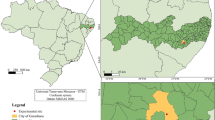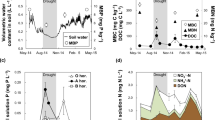Abstract.
The aim of the present study was to determine how long-term nutrient optimisation of Norway spruce stands affects the chemical composition of stem wood. Material for the study was collected from Flakaliden (Sweden) where Norway spruce [Picea abies (L.) Karst.] stands have been grown either without fertilisation or under nutrient optimisation treatment, by supplying a complete nutrient mix in the irrigation water every 2nd day during the growing season. The experiment was established in 1987 and in the autumn of 1998, 12 trees were harvested both in control (no fertilisation) and irrigated-fertilised (IL) stands. The increased growth rate caused by the IL treatment affected the chemical composition of the stem wood. The most pronounced effect was a 7% increase in lignin concentration caused by the IL treatment. Increases in concentrations of acid-soluble lignin (1.1-fold), extractives (1.2-fold), soluble sugars (1.3-fold), sterols (1.3-fold) and dehydroabietic acid (1.6-fold) as well as a decrease in the proportional quantity of terpinolene were also found. These results demonstrate that nutrient optimisation affected the chemical composition of Norway spruce wood, which may influence the suitability of such wood for specific end-use purposes.
Similar content being viewed by others
Author information
Authors and Affiliations
Additional information
Electronic Publication
Rights and permissions
About this article
Cite this article
Anttonen, .S., Manninen, .AM., Saranpää, .P. et al. Effects of long-term nutrient optimisation on stem wood chemistry in Picea abies . Trees 16, 386–394 (2002). https://doi.org/10.1007/s00468-002-0181-7
Received:
Accepted:
Issue Date:
DOI: https://doi.org/10.1007/s00468-002-0181-7




